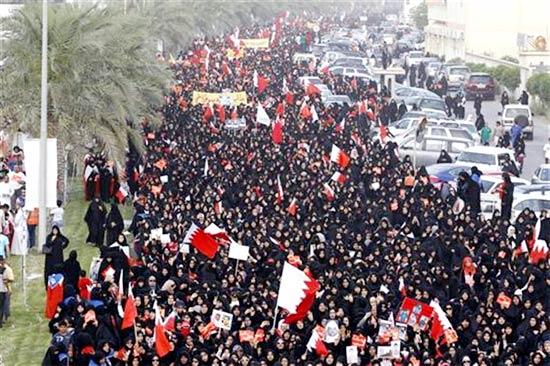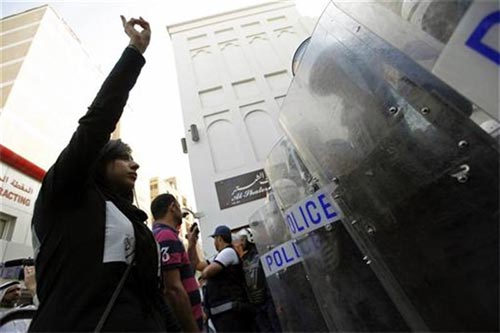Photographs: Hamad I Mohammed/Reuters
Dozens of armoured vehicles were deployed along the main highway to Bahrain's Formula One Grand Prix circuit on Saturday after police clashed with anti-government protesters who have promised to mark this weekend's race with "days of rage".
Security forces were stationed around the capital of Manama and along the road to the Bahrain International Circuit in Sakhir. Activists say barbed wire has been installed near some parts of the main highway.
The protesters, mostly from the majority Shi'ite Muslim community, blame the Sunni ruling elite for shutting them out of opportunities, jobs and housing. They have made it clear they will use the international attention the motor race has focused on Bahrain to air their grievances.
"The government are using the Formula One race to serve their PR campaign," said rights activist Nabeel Rajab. "It's not turning out the way they wanted."
'They need to fix the country first'
Image: A protester runs away from tear gas released by riot police during clashes after the rally by Bahrain's main opposition party Al Wefaq in Budaiya, west of ManamaPhotographs: Hamad I Mohammed/Reuters
Organisers have rejected calls from human rights groups to cancel Sunday's race because of what activists see as continuing political repression. The cars take to the track again on Saturday for practice and qualifying sessions.
"They need to fix the country first, then they can start looking at Formula One and other events," said Umm Hussein, one of 10,000 demonstrators who gathered near the capital, Manama, on Friday.
Police used teargas on Friday against masked youths throwing petrol bombs, who were trying to reach a traffic roundabout that was a rallying point during an uprising last year inspired by the Arab Spring revolts that toppled the presidents of Tunisia and Egypt.
Opposition leaders said they are not planning any organised mass rallies on Saturday, but did not rule out gatherings later in the day that might grow in size.
'We are committed to our programme of reforms'
Image: F1 supremo Bernie Ecclestone walks on the paddock with Crown Prince Sheikh Salman bin Hamad al-Khalifa and a government delegation after the second practice session of the Bahrain F1 Grand Prix at the Sakhir circuit in ManamaPhotographs: Ahmed Jadallah/Reuters
Last year's race was delayed, and then cancelled, after a brutal crackdown against pro-democracy protesters in Bahrain, a financial hub and modest oil producer that is also host to the Fifth Fleet, the US Navy's main outpost in the region.
Security forces from neighbouring Saudi Arabia came in, the streets were cleared and 35 people, including security personnel, died.
Since then, amid simmering unrest, Bahrain has invited in an independent commission to prescribe reforms and has enacted some, but human rights groups say there is still more work to be done. They say the kingdom's rulers are using the motor race to improve their international image.
"We are committed to our programme of reforms, but this week's unbalanced coverage does little to help the progress we are already making," a Bahrain Information Affairs Authority official said in a statement.
While sports journalists poured in to cover the race, non-sports reporters from Reuters and some other news organisations have not been granted visas to visit the Gulf island, which in 2004 became the first country in the region to host Formula One.
Hackers brought down the F1 website intermittently on Friday and defaced another site, f1-racers.net, to support what they described as the Bahraini people's struggle against oppression.
The circuit has been blanketed by multiple layers of security
Image: Force India driver Nico Hulkenberg of Germany drives during the first practice session of the Bahrain F1 Grand Prix at the Sakhir circuit in ManamaPhotographs: Steve Crisp/Reuters
Two of the 12 teams were left rattled after witnessing protesters throwing petrol bombs. Two members of the Force India team went home to Britain although the other team, Sauber, continued with race preparations.
At the Bahrain International Circuit, which has been blanketed by multiple layers of security, there were no incidents during Friday's practice runs.
Formula One chief Bernie Ecclestone described general security fears as "nonsense".
Team principals echoed the sentiment, saying they are confident in security measures, which they said are similar to arrangements seen at other Formula One races across the globe.
Young Bahraini protesters are carrying petrol bombs
Image: Zaynab (left), daughter of human rights activist Abdulhadi al-Khawaja, confronts riot police during an anti-government rally demanding his release, in ManamaPhotographs: Hamad I Mohammed/Reuters
Of particular concern to security personnel are young Bahraini protesters carrying petrol bombs who clash with police in Shi'ite villages surrounding the capital nearly every night.
Opposition leaders say around 95 protest organisers have been arrested in night raids in the past week and 54 people wounded in clashes, in which police have fired birdshot.
Also of concern is the health of hunger striker Abdulhadi al-Khawaja, one of 14 men in prison for leading an uprising last year.
Khawaja's family said he stopped drinking water on Friday, after being on hunger strike for more than 70 days. His death would be a major blow to the government, which is trying to make the case that reforms are under way.
His release, however, would also be a loss of face and could energise the opposition. Denmark, where Khawaja also holds citizenship, has offered to take him.
"His situation is very dangerous," said activist Rajab. "If he dies that will make people very angry."
Instrumental in founding found the Bahrain Centre for Human Rights, Khawaja is one of eight serving life sentences after he expressed support last year for Bahrain becoming a republic.







Comment
article